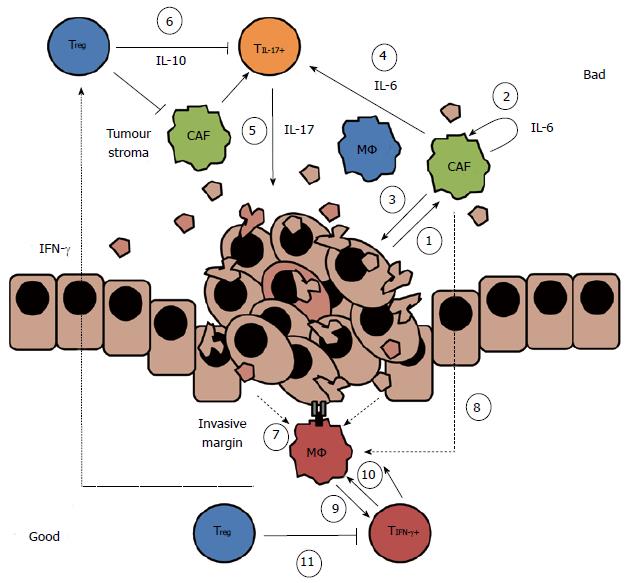Copyright
©The Author(s) 2015.
World J Gastrointest Oncol. Oct 15, 2015; 7(10): 221-232
Published online Oct 15, 2015. doi: 10.4251/wjgo.v7.i10.221
Published online Oct 15, 2015. doi: 10.4251/wjgo.v7.i10.221
Figure 1 Immune cell interplay in established colorectal cancer.
CAFs and macrophages play an important role in promoting tumour progression in the stroma, mediated by IL-6 (“Bad”). Conversely, immune responses at the invasive margin, including macrophage and T cell compartments inhibit tumour growth (“Good”). (1): Unknown factors from colorectal tumours promote IL-6 production from CAFs; (2) IL-6 promotes further IL-6 production from CAFs as well as initiation of VEGF production; (3) IL-6, IL-17, VEGF and ECM modulators produced by CAFs promote growth, angiogenesis and invasion of colorectal tumours; (4) IL-6 produced by CAFs or stromal macrophages promotes T cell differentiation towards an inflammatory IL-17 producing phenotype; (5) IL-17 producing T cells promote colorectal tumour progression and are associated with poorer patient prognosis; (6) Tregs suppress the inflammatory IL-17 response; (7) Macrophages at the invasive margin are associated with improved prognosis; (8) IL-6 produced in the stroma enhances the anti-tumour phenotype; (9) Invasive margin macrophages are primed to induce good effector T cell responses; (10) IFN-γ+ effector T cells are associated with improved prognosis in CRC; (11) Tregs can inhibit effector anti-tumour T cell responses. CAFs: Cancer-associated fibroblasts; IL: Interleukin; VEGF: Vascular endothelial growth factor; ECM: Extracellular matrix.
- Citation: Norton SE, Ward-Hartstonge KA, Taylor ES, Kemp RA. Immune cell interplay in colorectal cancer prognosis. World J Gastrointest Oncol 2015; 7(10): 221-232
- URL: https://www.wjgnet.com/1948-5204/full/v7/i10/221.htm
- DOI: https://dx.doi.org/10.4251/wjgo.v7.i10.221









